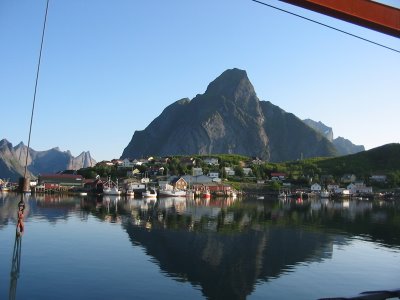Where there's ice and snow & the whalefishes blow
 The moratorium was never supposed to be permanent. It was originally intended to give scientists enough time to assess the world's badly depleted whale stocks and determine where sustainable quotas could be justified. And over the years, many whale populations were found to be in perfectly good health.
The moratorium was never supposed to be permanent. It was originally intended to give scientists enough time to assess the world's badly depleted whale stocks and determine where sustainable quotas could be justified. And over the years, many whale populations were found to be in perfectly good health.But the moratorium remained in effect anyway, because that's what certain powerful nations, such as the United States, Britain and Australia, wanted. Whales were "special," and that's all that mattered.
Now the International Whaling Commission is in danger of becoming worse than irrelevant. Even the venerable International Union for the Conservation of Nature (IUCN), which tracks the world's endangered animals, has called on it to shape up. Otherwise, it said, the world's whaling nations may "leave the IWC behind" and strike out on their own.
The day after the IWC adopted the "normalization" resolution on St. Kitts, the IUCN issued another warning: "More than ever there is a need to seek a form of consensus that will allow IWC to continue its work. Proponents and opponents all claim to support the conservation of whales but to date have failed to find common ground."
But there is often little common ground between the Save the Whales generation and younger conservationists more committed to the sustainable use of renewable resources -- the IWC's dysfunction is already infecting a whole range of international efforts to protect truly endangered species.
"We have to base resource management on science and knowledge, not on myths that some specifically designated animals are different and should not be hunted, regardless of the ecological justification for doing so," says Gro Harlem Brundtland, the ex-Norwegian prime minister who led the historic UN Commission on the Environment and Development. "There is no alternative to the principle of sustainable development. This is necessary and logical."
In the absence of such logic, the moratorium has resulted in perfectly healthy and abundant whale species showing up on the "banned" list of endangered animals maintained by the Convention on the International Trade in Endangered Species (CITES). For example, North Atlantic minke whales are listed even though neither the IWC nor the IUCN considers them in danger. As a result, the credibility of CITES is undermined, and a pall of doubt has been cast over the status of the truly endangered creatures it wants to protect.
The IWC's blanket ban on a commercial harvest also goes against the basic principles of the UN's 1992 "Rio Declaration," a hard-won consensus affirming that ecosystem health and species protection could be guaranteed only by the sustainable use of renewable resources.
That's from my piece in the Globe and Mail today.
What I left unsaid is that I rejoice in the way human beings are capable of drawing animals within the embrace of their empathy, and I don't think we need to apologize for that or surrender to a cold-blooded, purely scientific approach to the matter of the "sustainable" use of non-human life forms. I have a tremendous respect for Greenpeace, generally, and I like whales, personally. If it were up to me, even the whale-watching industry would be subjected to tighter controls, to deal with those huge speedboats full of tourists roaring among the killer whales around the islands where I live.
We don't have to be perfectly "rational" in these kinds of decisions, either.
But where's the line?
Australians are among the world's most ardent opponents of any and all whaling, and yet they slaughter tens of thousands of kangaroos every year, a practice Americans find so objectionable they've banned kangaroo meat. Hindu brahmins say killing cows is a sacrilege. North Americans recoil at the Southeast Asian custom of eating dogs. And on it goes. But if we're all really serious and sincere about the idea that people should live sustainably upon the renewable resources of the ecosystems within which they live, where do we get off telling Lofoteners they shouldn't be killing whales for a living, or telling Newfoundlanders they shouldn't be hunting seals?
These controversies are central to the contemporary challenges to principles that are universally applicable from practices that are specific to certain national, cultural and "religious" traditions.
Some lines you just don't cross. The Universal Declaration of Human Rights, for instance. That should apply to every nation state, everywhere, period. No apologies. No exceptions.
Once you allow cultural biases and eccentricities to completely override universal principles - such as the right of peoples to the sustainable use of natural resources, or the right of free speech, or freedom of assembly - then everything starts to collapse like a house of cards.
And that's exactly what's happening to the International Whaling Commission.





1 Comments:
Hi Terry,
I just saw your article at the G&M, and a very nice summary it was.
I was particularly interested to read Gro Harlem Brundtland's comments.
Helen Clark, current Prime Minister of New Zealand, basically adopted Greenpeace's policy as her government's whaling policy when she came to power in 1999/2000.
I've read that she has a huge amount of respect for Brundtland and regards her as a role model.
Of course, I wonder whether Clark seriously believes her own anti-whaling mantra, or has simply adopted it for political purposes.
Glad I was able to find your blog!
Regards,
David
Post a Comment
<< Home